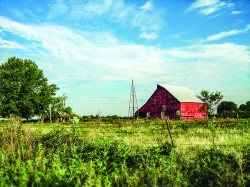Last Word | June 24th, 2015
 By Fred Kirschenmann
By Fred Kirschenmann
My family owns a farm near Medina, and we are now transitioning that operation to Steve Sund and his family. Our farm has always been, and will always remain, a family farm committed to serve the health of the land and the community.
In my career I’ve had the opportunity to directly observe the evolution of corporate-owned farms. Such farms operate by a single principle: maximum, efficient production for short-term economic return (especially return to the shareholders). There are no incentives in that business model to attend to the health of the land or the community. As an article from Time magazine pointed out in October 1992, the corporatization of U.S. agriculture makes farmers “virtual serfs on their own land.” That is not the path to a future sustainable food and farming system in this country.
The expansion of non-family corporations into North Dakota will enhance the undemocratic and unfair system that is damaging communities across the world. Non-family corporations are attacking Country of Origin Labeling (COOL), destroying food sovereignty and fighting to weaken laws that protect people, land and communities. It is in everyone’s interest to attend to this destructive process.
Weakening the anti-corporate farming law in North Dakota is a grim mistake. The movement toward large-scale industrial agriculture is not just about unfair economics; it is about the negative impacts on quality of life, the environment and destruction of rural communities. Non-family, corporate-controlled agriculture is destroying rural communities across the United States.
Furthermore, these structures are extremely energy intensive and cannot continue to operate as energy costs go up. As an example, when crude oil rose to $147/barrel back in 2007, corporate hog operations in Iowa were losing $20 a hog. We need to prepare for a future when crude oil will likely be much higher than that. We need to design farming systems that are more regenerative, more diverse and more self-renewing.
Corporate farms operating on the principle of short-term return, devoted to “getting big or getting out” and farming “fencerow to fencerow” are not sustainable. Family farms operating on the principle of taking care of the land and their communities will have a distinct competitive advantage.
Family agriculture in rural North Dakota is thriving because North Dakota’s farmers and ranchers are the experts. They are in the best position to make decisions about how to use their land and run their businesses. And most importantly, they operate on the principle of affection - affection for land, affection for community, affection for home, and for your neighbor. The focus for North Dakota must be on strengthening family-run agriculture, rural communities and using the tools we have to grow the economy from the bottom up.
We have an ideal system of family farm agriculture in ND. It is not a relic of the past - it is the agriculture of the future. North Dakotans support and want food produced on a family farm where food safety, food security, and stewardship of land and livestock are a way of life.
ND Farmers Union and Dakota Resource Council have got it right. Why change a system we know works? Together with volunteers from across the state, these groups have successfully completed a petition drive to refer SB 2351 which weakened protections for family-run ag in ND. The Secretary of State’s office is now verifying the over 21,000 signatures collected for placement on the June 2016 ballot.
All of this is not just about short-term economics as the June 12th Fargo Forum editorial implied, it is about long-term food and farming resilience, and that security is in everyone’s interest. How North Dakotans vote on this issue in 2016 will have a strong impact on our food future, and that does kick up more than a “dust devil’s worth of difference.”
[Editor’s note: Fred Kirschenmann is president of Kirschenmann Family Farms near Medina. A member of Dakota Resource Council, Kirschenmann has given talks around the world on agricultural issues and is the author of the 2010 book, “Cultivating an Ecological Conscience: Essays from a Farmer Philosopher.”]
December 2nd 2024
November 23rd 2024
November 20th 2024
October 25th 2024
October 21st 2024

__293px-wide.jpg)


By Josette Ciceronunapologeticallyanxiousme@gmail.com What does it mean to truly live in a community —or should I say, among community? It’s a question I have been wrestling with since I moved to Fargo-Moorhead in February 2022.…